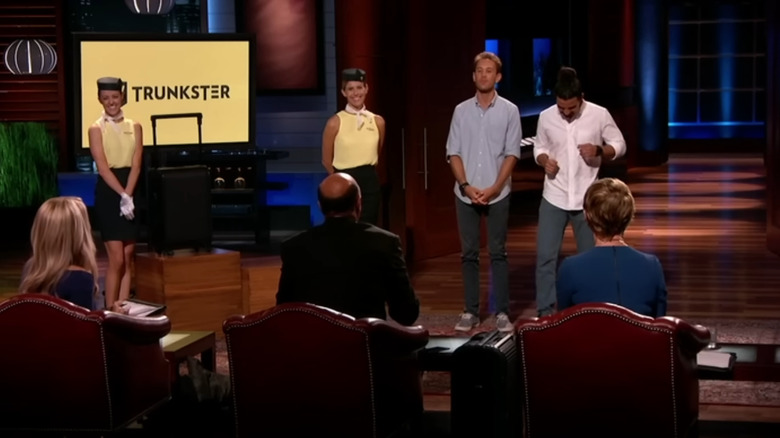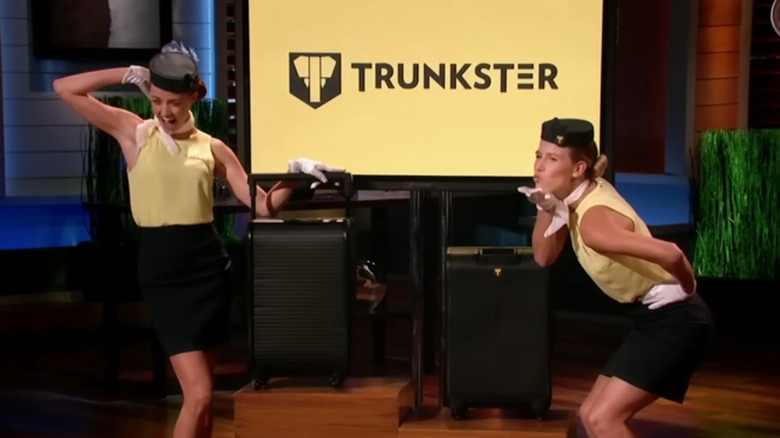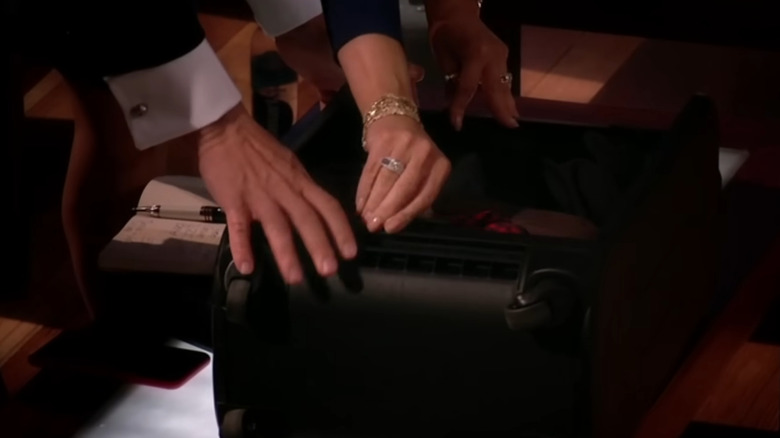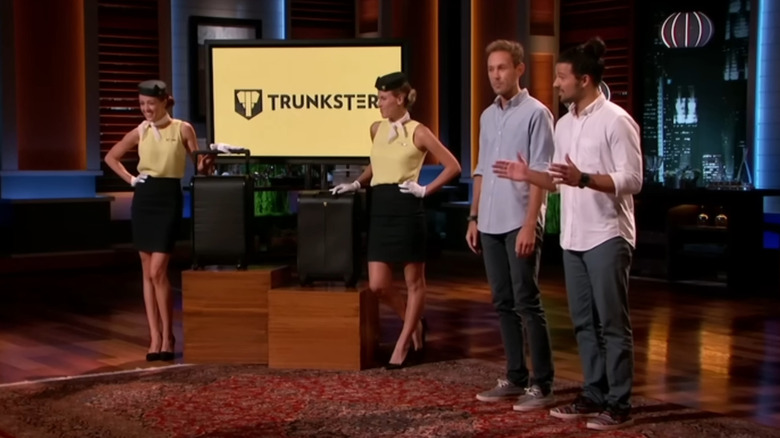Whatever Happened To Trunkster After Shark Tank?
We may receive a commission on purchases made from links.
Trunkster is looking to be the next step in smart luggage technology. It is the first-ever roll-top suitcase, giving users instant access to their belongings and removing the need for a traditional zipper. It also comes with an array of advanced features, such as a built-in handle scale, a battery-powered USB cord, and global tracking capabilities. On top of its high functionality, Trunkster luggage is constructed using airplane-grade aluminum and virgin polycarbonate to deliver a durable, stylish product.
The company was started by business partners Jesse Potash and Gaston Blanchet. In November 2014, they launched a Kickstarter campaign that far exceeded expectations. The operation hit its $50,000 goal in one hour and brought home a grand total of nearly $1.4 million. According to the entrepreneurs' comments during their "Shark Tank" appearance, it became Kickstarter's most crowd-funded travel campaign in history. They reached even greater heights when they raised another $1.5 million on Indiegogo. But were these promising pre-sales enough to convince a shark to invest in Trunkster?
What happened to Trunkster on Shark Tank?
Trunkster founders Gaston Blanchet and Jesse Potash appear on "Shark Tank" Season 7 seeking a $1.4 million investment for 5% of their company. Potash shares that he was drawn to creating Trunkster after shopping for luggage and failing to find a brand with a rich story behind it.
Blanchet's telling of Trunkster's story is cut short by Kevin O'Leary, who asks, "Which one of you do I absolutely tear to pieces now on a $28 million valuation?" The company is still in the pre-revenue and manufacturing stage, but believes that the massive interest from their crowdfunding efforts and their $2 million in pre-sales more than justifies the gargantuan ask. Each unit sells for $395 and costs 20% of that price to produce, or roughly around $79. They plan on selling direct-to-consumer through online sales and believe that Trunkster will shake up the luggage industry through its high quality and low price point.
It does little to convince the sharks, who believe Trunkster is worth around $5 million. Robert Herjavec likes the presenters enough to offer the $1.4 million for 30%, followed by O'Leary, who wants 37%. Lori Greiner is interested but remains wary of the risk and proposes to use the $1.4 million to fund purchase orders for 15% equity. Mark Cuban is willing to go in with Greiner if they can alter the deal appropriately. After some deliberation, the duo asks for $1.4 million for 5% per shark, with the stipulation that if their investment isn't recouped in two years, their equity increases to 10%. Additionally, they add on a royalty of $1 per unit once the money is paid back. Cuban and Greiner take the deal.
Trunkster after Shark Tank
Things seemed promising for Trunkster after founders Gaston Blanchet and Jesse Potash managed to nab a deal with Lori Greiner and Mark Cuban. The extra pressure of having to pay back the $1.4 million investment within two years served as motivation for the team. "To know that in two years you'll definitely have that money back or there's a penalty then that makes us work harder and makes them more secure," Potash said in a confessional following their "Shark Tank" pitch.
Sadly, this optimistic viewpoint failed to line up with reality. Despite the success of their Kickstarter and Indiegogo campaigns, Trunkster experienced several problems when it came time to deliver. Throughout 2016, a handful of updates were released on these platforms updating backers on the many delays caused by missing materials and other dilemmas. It wasn't an entirely tumultuous time, as the company managed to win the International Travel Goods Show Product Innovation Award in March. The last publicly released update was in June 2016, when the team shared that they had shipped out 90% of the Kickstarter orders and were in the process of getting the rest fulfilled within the following few weeks. Unfortunately, this never ended up being the case, as many customers complained about never receiving their orders and began demanding refunds not long after.
Why did Trunkster go out of business?
Trunkster would sadly join the ranks of other defunct "Shark Tank" businesses, such as Biem, HyConn, and Foot Fairy. Gaston Blanchet's LinkedIn account lists that his time as Trunkster's co-founder came to an end in July 2018, indicating that the company itself likely died down around the same time. The official website and all social media for Trunkster have also gone defunct.
While Trunkster undeniably had its fair share of difficulties in getting orders fulfilled, the team didn't make the situation any better with the way they treated their customers. Not only did countless backers fail to receive their promised items, but no evidence exists of the company responding to or acknowledging these complaints. As a result, many have deemed Trunkster as a scam and some on Kickstarter even discussed taking legal action against the business.
The handful of backers who did receive their Trunkster luggage were left largely unsatisfied by its weak design and functionality. As Kickstarter backer Donna Smiley wrote, "I only received my carry-on which broke after just a few uses – won't stay closed. I'm awaiting the checked size, but if that's not possible, I'd like a replacement of another checked bag instead since I spent $710 for NOTHING!!"
What's next for Trunkster's founders?
With a record-breaking crowdfunding campaign, two passionate entrepreneurs, and a deal with some coveted investors, Trunkster had the potential to become one of the greatest success stories to come out of "Shark Tank." Sadly, its legacy has been tarnished by its neglectful treatment of its customers.
Despite this, it appears the founders are doing well for themselves. Currently, finding recent details on Jesse Potash is practically impossible, as he possesses no prominent social media presence anywhere, including on LinkedIn. Co-founder Gaston Blanchet has not only remained more active on LinkedIn, but has even spearheaded new and seemingly more successful business ventures. In June 2020, he co-founded Storypod, a consumer goods company that has developed a screen-free audio system that plays music and stories for children when attached to a smart figure.
Ironically, Blanchet started another successful Kickstarter campaign for Storypod that managed to raise over $240,000 from a $25,000 goal. This time around it seems Blanchet learned from Trunkster's mistakes, as customer complaints are few and far between. The business has also seemed to do well for itself in other areas, being featured on outlets such as "Good Morning America."
"Shark Tank" is available for purchase on Prime Video.




